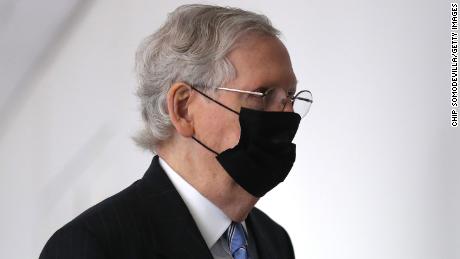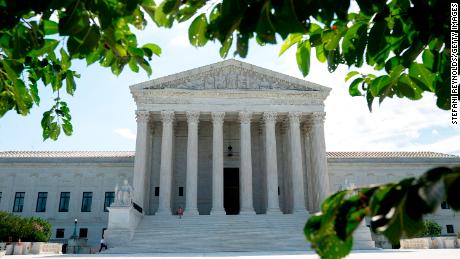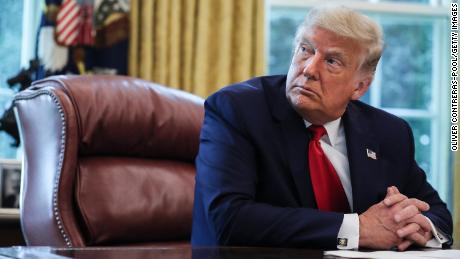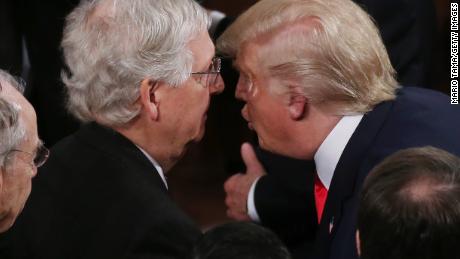Washington (CNN)Senate Majority Leader Mitch McConnell vowed on Friday that whomever President Donald Trump nominates to replace the late Justice Ruth Bader Ginsburg will get a vote on the Senate floor, signaling a historic fight in Congress over one of the most polarizing issues in American politics.
"President Trump's nominee will receive a vote on the floor of the United States Senate," McConnell, a Kentucky Republican, said in a statement Friday evening that sets GOP lawmakers on a collision path with Democrats, though the exact timing of such a fight -- in particular how much of it would happen ahead of or after Election Day -- was not immediately clear.
Senate Majority Whip John Thune, the number two GOP senator, backed McConnell, saying in a statement of his own, "I believe Americans sent a Republican president and a Republican Senate to Washington to ensure we have an impartial judiciary that upholds the Constitution and the rule of law. We will fulfill our obligation to them. As Leader McConnell has said, President Trump's Supreme Court nominee will receive a vote on the floor of the U.S. Senate."
GOP aides are skeptical that there is enough time to confirm a nominee before November 3, given that Supreme Court nominees typically take two to three months to process, according to a review of recent confirmation proceedings.
But that process could be sped up if McConnell, who controls the majority of the chamber, has the votes to confirm a replacement, and there is enough time to confirm someone in a lame-duck session of Congress after the November elections.
That calculation is further complicated if Republicans lose control of the Senate and the White House after the election -- and whether enough GOP senators would break ranks and oppose any nominee by a President who had just lost his election and a GOP Senate that just lost its majority.
Senate Republicans, who hold the majority in the upper chamber, only need 51 votes to confirm a new justice once one is formally nominated. Currently, there are 53 GOP senators -- meaning they can only lose three Republicans. In the event of a 50-50 split, Vice President Mike Pence could cast a tie-breaking vote.
Already, Republican Sens. Lisa Murkowski of Alaska and Susan Collins of Maine have said that there is not enough time to confirm someone before November.
Collins told The New York Times earlier this month that she'd oppose seating a nominee in a lame-duck session if Joe Biden wins the White House.
It's unclear if more Republicans would break ranks.
CNN has reached out to Collins, Murkowski and Sen. Mitt Romney of Utah -- among others -- to seek their position on the matter.
In a message to GOP senators on Friday, McConnell urged his colleagues not to lock themselves into a position that they may regret later and counseled them to be cautious about what they are telling the media about their views on how to process the nomination, according to a person who saw the note. He urged them to "keep your powder dry."
McConnell did not indicate a timeframe for considering the nomination but made clear he believes there's enough time to take up the nominee this year.
While GOP Senate sources believe action on a nominee will likely wait until a post-election, lame-duck session of Congress, it's possible it could be moved up for this reason: The possibility of court fights over the election results and the need for nine justices on the court to resolve any disputes.
A GOP Senate source said that this topic will be under discussion with senators as they decide whether to fast-track a nominee before November.
In July, Republican leaders signaled they would confirm a nominee this year.
"We will," said Sen. John Thune of South Dakota, the second-ranking Republican leader, when asked if the Senate would fill a vacancy, even during the lame-duck session after the presidential election. "That would be part of this year. We would move on it."
But Senate Judiciary Chairman Lindsey Graham wasn't sure if he would agree to that.
"I'd like to fill a vacancy. But we'd have to see. I don't know how practical that would be," Graham told CNN in July. "Let's see what the market would bear."
McConnell's vow that a nominee would get a vote set up a clash with the top Democrat in the Senate, Chuck Schumer of New York, who said earlier Friday that a Supreme Court vacancy "should not be filled until we have a new president."
"The American people should have a voice in the selection of their next Supreme Court Justice. Therefore, this vacancy should not be filled until we have a new president," the top Senate Democrat tweeted in a reference to a statement made by McConnell in 2016 after the passing of Supreme Court Justice Antonin Scalia.
Ginsburg died on Friday due to complications of metastatic pancreas cancer, the court announced. She was 87.
Earlier this year, McConnell reiterated his position that the GOP-led Senate would confirm a nominee to any Supreme Court vacancy that occurred this election year, despite leaving a seat vacant in 2016 and preventing President Barack Obama's nominee from consideration.
Graham expressed his condolences over Ginsburg's passing Friday evening.
"It was with great sadness that I learned of the passing of Justice Ginsburg. Justice Ginsburg was a trailblazer who possessed tremendous passion for her causes. She served with honor and distinction as a member of the Supreme Court," the Republican South Carolina senator tweeted.
He went on to say, "While I had many differences with her on legal philosophy, I appreciate her service to our nation. My thoughts and prayers are with her family and friends. May she Rest In Peace."
House Speaker Nancy Pelosi announced Friday evening that flags over the US Capitol building are flying at half staff in honor of the late justice.
In a statement, Pelosi said, "We must honor Justice Ginsburg's trailblazing career and safeguard her powerful legacy by ensuring that the next Associate Justice of the Supreme Court upholds her commitment to equality, opportunity and justice for all. "
Ginsburg was appointed in 1993 by President Bill Clinton and in recent years served as the most senior member of the court's liberal wing, consistently delivering progressive votes on the most divisive social issues of the day, including abortion rights, same-sex marriage, voting rights, immigration, health care and affirmative action.
One additional element that might impact the looming nomination fight is the Arizona special election.
The Arizona Republic is reporting that if Democratic Senate candidate Mark Kelly wins a November 3 special election against GOP Sen. Martha McSally, he could be sworn-in as soon as November 30, meaning the balance of power in the Senate would shift from the current 53 Republicans and 47 Democrats to 52 Republicans and 48 Democrats.
That difference could impact the ability of McConnell to confirm a replacement for Ginsburg given that some GOP senators have expressed reluctance to filling a Supreme Court vacancy during a presidential election year.
The newspaper makes clear, however, that getting Kelly sworn in then is not a done deal and may be contested, saying, "Two Republican and Democratic election attorneys agree that state law and Senate practice would make Kelly eligible to take over the seat once held by Sen. John McCain as soon as Nov. 30, when the state election results are expected to be canvassed."
This story has been updated with additional developments Friday.























